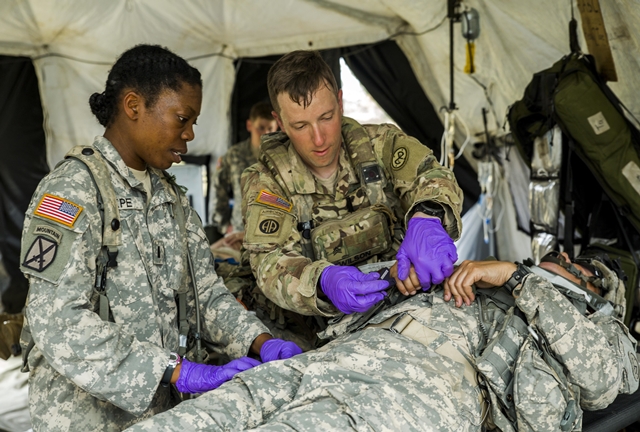
New York National Guard medics training at Fort Polk, Louisiana (Sgt. Harley Jelis, nationalguard.mil)
10 June 2019. The U.S. Department of Defense is supporting creation of a small, portable device that safely sends vaccines and therapies through the skin. The device is being developed by Inovio Pharmaceuticals Inc. in Plymouth Meeting, Pennsylvania, and funded by an $8.14 million award from DoD’s Medical CBRN Defense Consortium; CBRN stands for Chemical, Biological, Radiological, and Nuclear threats.
Inovio Pharmaceuticals is a developer of vaccines and therapies for infectious diseases and cancer, licensing discoveries from the lab of immunologist David Weiner, now director of the Wistar Institute’s Vaccine Center and previously at University of Pennsylvania. Weiner and colleagues are seeking faster and easier methods to make vaccinations protecting against infectious diseases.
In this process, called DMab — short for DNA monoclonal antibody — DNA fragments are ingested into cells, where they’re exposed to 3 to 4 mild electrical pulses. Inovio calls this electronic assistance its Cellectra system that increases the uptake of DNA to generate more antibodies.
According to the company, the new device called Cellectra 3PSP, advances the Cellectra technology into a small, portable battery-powered device to administer Innovio’s vaccines through the skin by military personnel in the field. Innovio says its vaccines for Zika, Ebola, and HIV are being tested with through-the-skin delivery in clinical trials that reveal the technology induces strong immune responses. The company cites a recent trial of its HIV vaccine that generates anti-HIV antibodies and therapeutic T-cells in all participants.
In January 2019, Science & Enterprise reported on the beginning of a clinical trial testing an Innovio vaccine to protect against Zika that uses synthetic DNA particles to produce antibodies targeting the virus. And a report in November 2018 shows a similar vaccine protects lab mice against the Ebola virus. In both cases, the vaccines use Innovio’s DMab and Cellectra technologies.
“Our Cellectra 3PSP,” says Kate Broderick, Innovio’s vice-president for R&D in a company statement, “is a small, portable user-friendly device which will allow broader access to Inovio’s vaccines and immunotherapies, whether the vaccine is administered to our troops ready to be deployed around the world, at a local pharmacy, or in challenging settings such as rural Africa.” Broderick is the principal investigator on the project that also covers testing of the device with new DNA vaccines developed by U.S. Army’s Medical Research Institute of Infectious Diseases.
The Medical CBRN Defense Consortium was formed to create a new means for DoD to engage with businesses, academic institutions, and not-for-profit organizations — particularly companies and organizations new to DoD contracting — for meeting the military’s need to respond more quickly to unforeseen medical requirements and threats from non-traditional weapons.
This $8.14 million award and other consortium grants use a funding mechanism called Other Transaction Agreements that the agency says enables “fast acquisition of critically needed technologies in areas as diverse as shipbuilding, armaments, satellites, medical devices, and electromagnetic spectrum technologies.” Other Transaction Agreements, says the agency, bypasses the usual government acquisition regulations to bring “innovative research findings and state-of-the-art prototypes from industry to the federal government.”
More from Science & Enterprise:
- A.I., Robotics Studied for Military Trauma System
- MIT, Air Force to Open A.I. Accelerator Lab
- 3-D Printed Scaffolds with Stem Cells, Sensors Studied to Repair Bones
- Trials to Test Stem Cell Treatments for Eye Injuries
- Exosuit Designed for Personalized Walking Help
* * *

 RSS - Posts
RSS - Posts
You must be logged in to post a comment.